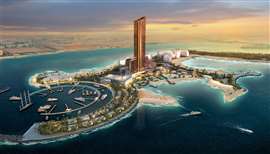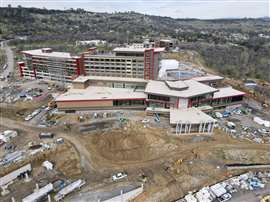High Rollers: New wave of casino building spells global opportunities for contractors
05 March 2024
Cities around the world are gambling on a new wave of super casinos attracting tourism and inward investment. Lucy Barnard finds out how this could spell big wins for contractors.
For Middle Eastern contractor ALEC, casino construction is a new specialism.
Although the engineering and contracting specialist has built plenty of luxury hotel resorts, museums and theme parks across the UAE, until late last year, like most construction firms in the Gulf, where large-scale gambling has been outlawed for decades, gaming facilities were absent from its projects list.
But in November 2023 all that changed when ALEC, which is part of the Investment Corporation of Dubai, won the main contract to build the country’s first gaming resort in the northern emirate of Ras Al Khaimah.
The Wynn Al Marjan Resort, located on a man-made archipelago of four islands off the coast of RAK, will be run by Nevada-headquartered casino operator Wynn Resorts, whose portfolio includes Wynn Las Vegas and two vast casino resorts in Macau and is expected to open in 2027.
 Wynn Al Marjan Resort. Image: Wynn Resorts
Wynn Al Marjan Resort. Image: Wynn Resorts
“ALEC has successfully developed its reputation as a multifaceted main contractor by delivering some of the region’s most challenging projects,” said ALEC managing director Barry Lewis in a statement. “We look forward to utilising our extensive experience to deliver what will indisputably be a waterfront destination unlike anything ever seen before.”
Certainly, the project, which includes a casino, 1,500 guest rooms, 24 restaurants and lounges, a spa, a shopping centre, a theatre and a convention centre, will be unlike anything seen before in the country where gaming was only legalised in 2023 when the government established a General Commercial Gaming Regulatory Authority which has the power to grant a single casino license to each of the seven emirates if they wish to open up to gambling.
Currently gambling is illegal not just in the UAE but across the Gulf region, where punters must travel as far as either Egypt or Lebanon to bet in a casino.
Yet as governments across the region look to diversify their economies away from hydrocarbons and to increase tourist traffic in the region, it looks as though a new wave of casino construction is set to take place, spelling out lucrative construction contracts for all kinds of contractors and subcontractors.
Lucrative construction contracts
A 2023 report by Bloomberg Intelligence estimates that the UAE could generate up to US$6.6bn in gambling revenue each year – potentially surpassing that of Singapore – with local rumours suggesting Abu Dhabi could be the next in line for a similar resort development.
And it’s not just the strict Middle East which is opening up to casino development, creating lucrative construction contracts. Around the world cities where gaming and gambling were outlawed are relaxing the rules and allowing ever bigger integrated casino resorts in the hope of boosting tourism and spurring economic growth.
 General view of the entrance of the casino of the City of Dreams Mediterranean, Europe’s first integrated resort boasting what operators say is the largest casino in Europe. Photo: Yiannis Kourtoglou/ Reuters
General view of the entrance of the casino of the City of Dreams Mediterranean, Europe’s first integrated resort boasting what operators say is the largest casino in Europe. Photo: Yiannis Kourtoglou/ Reuters
In Europe, the government of Cyprus is betting that a new integrated casino resort developed and operated by Hong Kong-based Melco Resorts & Entertainment will attract some 300,000 additional visitors to the Mediterranean each year.
Last year, City of Dreams Mediterranean, a 16-storey, 500-room casino hotel on the outskirts of Limassol, designed by Atkins and constructed by Greek builders Avax and Terna, opened its doors.
Avax said that the construction contract for the 96,000 square metre resort, which also includes a family adventure park, sports facilities and the island’s largest swimming pool complex, was worth around €270 million (US$290.4 million).
Meanwhile, also in 2023, the Japanese government was approving a plan to build Japan’s first casino in the western city of Osaka, paving the way for a US$8.1bn resort set to open in 2029 aimed at attracting domestic and international tourist spending. Nevada-based casino operator MGM Resorts International and local partner Orix Group are spearheading the project.
The USA is a country which has a long and complicated history of casino gambling, principally because although it is legal under US federal law, most states impose bans or restrictions on casinos due to their associations with addiction, vice and organised crime.
In the 1930s, Nevada’s decision to legalise gambling led to the city of Las Vegas becoming synonymous with the biggest flashiest casino hotels in the world while New Jersey legalised casinos in the 1970s. In the early 1980s a Supreme Court ruling allowed Native American to conduct gambling on their own lands. This has grown into a US$39bn industry for 243 federally recognized tribes in 29 states. And in the 1990s states including New York, Louisiana and Michigan relaxed the rules.
Now two of the country’s biggest cities, New York and Chicago, are also in the process of allowing permanent Las Vegas-style mega casinos.
New York’s Gaming Facility Location Board is currently weighing up bids by real estate developers and casino operators who want to open the city’s first major super-casino in the city after the state last year said it would approve up to three new casino licenses for the New York City area.
Who are the New York casino bidders?
Bidders include Wynn Resorts partnered with Related Companies which wants to build a casino on Manhattan’s Far West side, Nevada-based Caesars Entertainment, partnered with SL Green Realty which want to build a gambling hall in Times Square and Rhode Island-headquartered Bally’s Corporation which wants to develop a casino in the Bronx.
In 2019, Illinois passed a bill that would allow six new casinos across the state including one mega casino in Chicago. Last year, the state granted Bally’s Corporation a license to take bets in Chicago, allowing the company to operate a temporary casino at the city’s historic Medinah Temple for three years and to establish a 505,000 square foot casino complex in River West, the site of the Chicago Tribune printing plant.
Moreover, the new construction, coupled with a rise in online gambling is also prompting a further wave of rebuilds and renovations at existing gambling houses as owners and operators struggle to compete in an increasingly crowded market.
 The Chicken Ranch Casino, California. Image: Suffolk
The Chicken Ranch Casino, California. Image: Suffolk
The Chicken Ranch casino in Jamestown, California, which is owned by the Chicken Ranch Rancheria of Me-Wuk Indians is one example of an old-style US casino which is set to be replaced in mid-2024. Contractor Suffolk Construction is currently completing work on a 756,000 square foot, nine-storey, 196 room hotel with a day spa, fitness centre, roof top pool and a conference centre located next to the original casino, opened in 1985.
In Verona, New York, the Oneida Indian Nation is investing US$370m into expanding its Turning Stone Resort Casino to include a new Gensler-designed 77,000 square foot convention centre, a 258-room hotel and an onsite medical centre. Syracuse-based contractor Hayner Hoyt has been appointed main contractor.
The US contractors with the greatest revenue from casino construction, Yates Companies, Swinterton and Suffolk Construction have all in recent years boosted their casino and hospitality offering in order to cash in on hotel and casino building opportunities.
“The gaming and resort sector continues to show signs of significant growth in the years ahead,” said Pete Tuffo, president of Suffolk’s National Gaming Centre of Excellence as the company announced it had appointed Tutor Perini industry veteran Chris Creasy as its new vice president of gaming.
Macau bets on non-gambling tourist attractions
Meanwhile, in the Chinese territory of Macau, the world’s biggest gambling centre by revenue, construction opportunities lie, not so much in the creation of new casinos but rather in the non-gambling facilities being built around them.
In 2022, the city’s government agreed to renew gambling licenses for Macau’s six largest casino operators for ten years in return for them spending around US$15m on non-gambling related tourist attractions as part of a government plan to diversify the city’s economy and to crack down on wealthy Chinese businessmen using the casinos as a way of taking their money out of the country.
These include plans by Hong Kong-based Galaxy Entertainment to build a 61,000 square meter high-tech amusement park, incorporating multi-media, interactive and multi-sensory technologies, and proposals by Las Vegas Sands to build a 50,000 square meter garden-themed destination and conservatory.
Brought To You By
|
STAY CONNECTED



Receive the information you need when you need it through our world-leading magazines, newsletters and daily briefings.
CONNECT WITH THE TEAM








